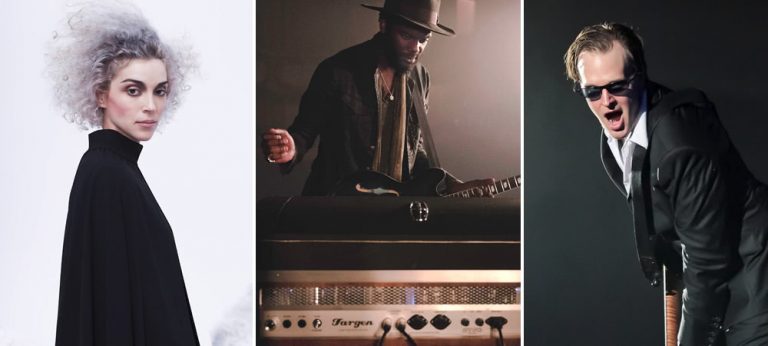To be a ‘guitar hero’, praised by legions of fans and fellow guitarists alike, is something sought by many and achieved by few who play the six-string these days.
How do you separate yourself from the thousands upon thousands of other axemen and women also vying for the title? More than that, how do you convince people to stop fawning over the established guitar gods – the Jimmy Pages, Angus Youngs and Slashes – and give you their attention for long enough to see what you can do?
Fortunately for young guitar nuts such as myself searching for someone from our own generation to look up to, it’s still possible for guitarists to rise to prominence in modern music. Here are six modern maestros who have emerged this decade and are contributing something original and masterful to the art form.
Joe Bonamassa
It might be a stretch to say Bonamassa’s a guitarist that has emerged this decade – he opened for the late BB King as a 12-year old, after all! But it’s been in this decade that the New York-born blues rocker has asserted himself as a guitar titan.
Bonamassa has lent his lightning fast licks and emotionally-charged phrasing to a dozen albums since 2010, including four of his own, three as part of rock supergroup Black Country Communion, and the Grammy-nominated Seesaw with LA songstress Beth Hart.

Scott Holiday (Rival Sons)
Taking his cue from contemporaries Jack White and The Black Keys’ Dan Auerbach, Holiday incorporates generous serves of fuzz and slide into his ear-splitting lead playing.
The spectacularly-moustachioed guitarists’ penchant for bombastic, meaty riffs also have many in the classic rock community excited – Rival Sons are now being hailed as the band that will give rock and roll the kickstart it needs to endure in the 21st century.

St Vincent/Annie Clark
The phrase “Oh, and she’s a woman” has plagued electric guitar since it first became a force in popular music, devaluing the careers of guitarists Sister Rosetta Tharpe, Joan Jett, Lita Ford and Marnie Stern alike.
Hopefully this is changing, because if St Vincent is anything to go by, female guitarists are an untapped reservoir of pioneering talent. Her Grammy-winning eponymous effort from 2014 sees St. Vincent use sharp-edged chords and leaping hammer-ons to punctuate her often sardonic lyrics, and she may yet become this decade’s ambassador for axewomen if her guitar stays at her side as her fame grows.

Gary Clark Jr.
Speaking of keeping an established genre of music alive, this lanky guitar luminary out of Austin has been called “The Future of Texan Blues” by none other than Barack Obama.
Clark can shred it with the best blues guitarists out there past and present, but is celebrated for the restraint he exercises in playing by feel, and for pushing the Blues into new territory, blending it with his more modern Urban and R’n’B influences. A star on the rise, Clark has shared the stage with the Rolling Stones and appeared on the Foo Fighter’s Sonic Highways.

Harts
Lead guitarists aren’t limited to Blues and Rock in deciding which genre to apply their skills to in modern music, and Indian-born Melbourne-based Darren Hart is living proof.
While he attacks the upper reaches of the fretboard with all the intensity and gusto of Hendrix, the 23-year old bedroom prodigy is as much a Disco or Funk as a Psychedelic rocker for the pulsing electro dance beats that form the base of most of his songs.
He’s been compared to a young Prince by none other than the Purple One himself, and with such a big name in his corner we wait in anticipation of Harts’ conquering of global audiences.

Alex Laska (Kingswood)
Another Melbourne boy, Laska grew up a protege of ACDC’s Angus Young, and emulates his hero through strutting power-chord rhythms and squealing solos on Kingswood’s debut LP Microscopic Wars.
While Kingswood have recently veered away from their rock/blues roots, Laska has already proven himself a versatile guitarist: witness the sexy, bluesy solo on ‘I Can Feel That You Don’t Love Me’ – a track on which he also provides lead vocals.


































